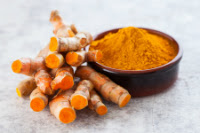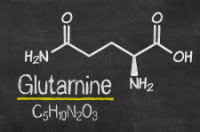
Turmeric (Curcuma longa) is the golden-orange spice that gives curried foods pizzazz. In Traditional Chinese and Indian Medicine, turmeric is used to treat allergies, digestive ailments, and pain. The active chemical component of turmeric is curcumin, known for its anti-inflammatory properties. Today, research is focused on the role curcumin plays in diseases where the underlying factor is inflammation, such as in heart disease and arthritis.
Studies show that curcumin blocks inflammation at the cellular level. Some studies indicate that curcumin’s role in preventing joint inflammation surpasses its ability to reduce active joint inflammation. In clinical trials, standardized curcumin supplements helped improve pain and swelling in patients with RA. These promising results are being further investigated in long-term studies.
Including turmeric in your diet is easy to do and, oh, so flavorful. Add turmeric to soups and dressings; sprinkle over meats, veggies, and scrambled eggs; add it to plain yogurt or a smoothie.
While adding turmeric spice to your meals is a great first step, the amounts used in cooking do not provide the therapeutic levels needed to achieve its robust health effects. When considering the addition of turmeric to your health plan, work with your La Mesa Naturopathic Doctor to determine if this is a good choice and which curcumin supplement is best for you. He or she can recommend the right form (capsule or powder) that will have the best bioavailability – meaning it’s easy for your body to process through the digestive tract – for your specific health needs. It is very important to use a high quality tumeric supplement to ensure its effectiveness.
References
Contact our office for more information
Journey of Health Medical Clinic
619-772-1164
 How did gluten, a naturally-occurring protein found in wheat, barley and rye – sources of nutrition for people over thousands of years, become so unhealthy?
How did gluten, a naturally-occurring protein found in wheat, barley and rye – sources of nutrition for people over thousands of years, become so unhealthy? There’s much more to that sweet, fluffy treat we enjoy melted in a s’more or sprinkled atop hot cocoa. Marshmallow (Althaea officinalis) is an ancient herb whose Greek name, Althainean, means “to heal.” Ancient Greek and Egyptian healers used Marshmallow flowers and leaves in salads to support healthy digestion. A secretion, known as mucilage, from its roots and stems, was used to soften the skin, treat sore throats, and ease congestion. Naturopathic doctors use Marshmallow Root (aka “mallow”) for these purposes and in treatment preparations for:
There’s much more to that sweet, fluffy treat we enjoy melted in a s’more or sprinkled atop hot cocoa. Marshmallow (Althaea officinalis) is an ancient herb whose Greek name, Althainean, means “to heal.” Ancient Greek and Egyptian healers used Marshmallow flowers and leaves in salads to support healthy digestion. A secretion, known as mucilage, from its roots and stems, was used to soften the skin, treat sore throats, and ease congestion. Naturopathic doctors use Marshmallow Root (aka “mallow”) for these purposes and in treatment preparations for:


